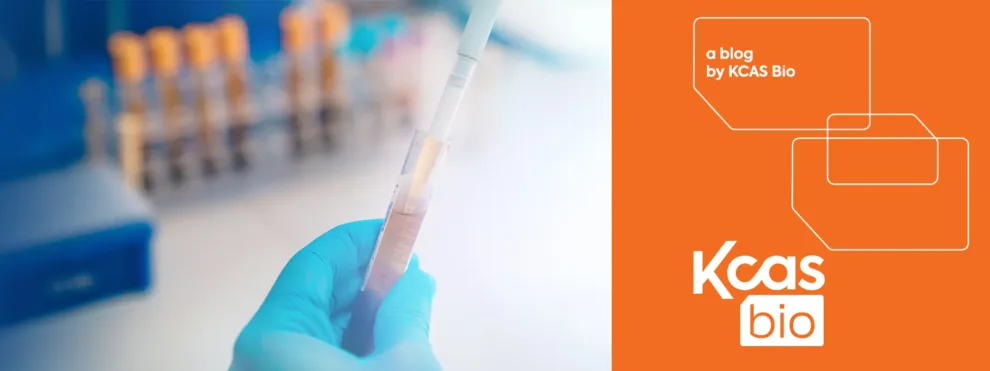Why Sample Matrix Choice Matters
Choosing the right sample matrix is one of the most critical decisions when designing a flow cytometry assay. Each option offers unique advantages and limitations that can directly impact data quality, logistics, and study outcomes.
- Flow cytometry requires intact, viable cells. The power of flow cytometry lies in evaluating responses and phenotypes of individual live cells. Plasma, serum, or lysed cells are generally not suitable matrices for flow cytometry.
- Matrix selection affects everything: From absolute counts and functional readouts to logistics, sample stability, and assay design. Early choices about the sample matrix for your assay can significantly impact design and assay success.
- KCAS Bio advantage: With decades of experience in routine and custom flow cytometry assays, global logistics, and available validated protocols tailored to each matrix type, KCAS Bio can help guide you toward selecting the appropriate matrix and move efficiently from method development through sample analysis.
| Matrix | Advantages | Use Cases | Limitations | KCAS Bio Differentiators |
| Whole Blood (Fresh) | Native cellular environment, absolute counts, minimal prep | Receptor occupancy, immunophenotyping, functional assays | Premium cost, short stability window, needs rapid processing TAT | Globally harmonized presence, Lab support access 6 days/week, rapid TAT, centralized analysis |
| Fixed Whole Blood (Cyto-Chex®, Transfix®) | Extended stability (up to 14 days), maintains phenotype, supports absolute counts | Clinical trials across multiple sites, immunophenotyping, RO assays | Not compatible with functional assays, fixation impact to cell-type varies | Globally harmonized presence, Lab support access 6 days/week, Validated protocols for Cyto-Chex®, logistical expertise |
| Frozen Whole Blood (Smart Tube®, Teiko Toku®) | Long-term storage (6–9 months), centralized analysis | Batch evaluations and retrospective analysis studies | May impact cell viability and marker fidelity | Custom In-house method development and validation, Experienced in unique matrix methods |
| PBMCs (Fresh or Frozen) | Functional viability, batch testing, retrospective analysis | Cytokine profiling, T-cell activation, evaluation by comprehensive spectral flow panels | Not suited for absolute counts, loss of certain populations | Expert isolation at 4 sites, off-the-shelf method libraries |
Matrix Selection by Objective
| Your Goal | Recommended Matrix |
| Quantify immune cells (e.g., B cells, Tregs) | Fresh Whole Blood + Counting Beads |
| Functional assays (e.g., Cytokine, Cytotoxicity) | Fresh Whole Blood or PBMCs (fresh or frozen) |
| Multi-site trials or overcoming site logistical challenges | Fixed Blood (Cyto-Chex®, Transfix®) or PBMCs |
| Long-term biobanking | Cryopreserved PBMCs |
| Preserve cell surface markers and phenotype | Cryopreserved PBMCs or fixed/frozen whole blood |
Important Considerations
- Absolute cell counts require whole blood. Unlike PBMCs, which are not compatible with single-platform counting methods, whole blood preserves the native cellular environment and enables accurate quantification of immune cell subsets.
- Anticoagulants matter. The choice of anticoagulants (e.g., EDTA, heparin, citrate) can alter cell populations and affect the ability to perform functional readouts. With years of experience across diverse assay types, KCAS Bio helps guide informed anticoagulant selection to ensure reliable results.
- Functional readouts need live cells. Many assays depend on cell viability to evaluate functional responses. Because fixation eliminates the ability to discriminate live from dead cells, fresh or properly preserved samples are critical for functional analysis.
KCAS Bio: Experts in Global Flow Cytometry
Selecting the right sample matrix is essential for reliable flow cytometry data. Each option comes with trade-offs in stability, function, and logistics, so making informed choices early ensures strong study outcomes.
- Validated and Exploratory methods for use with Smart Tube®, Teiko Toku®, Cyto-Chex®, Transfix®, and more
- Expertise across all matrices, including novel formats under evaluation
- Global support & centralized data analysis for efficient delivery of reliable results. Standard data delivery for most assays occurs within a few weeks of sample acquisition. Expedited data analysis and delivery are available upon request and tailored to meet your program needs.
KCAS Bio is here to help you choose wisely and execute with confidence. Reach out to connect today.

